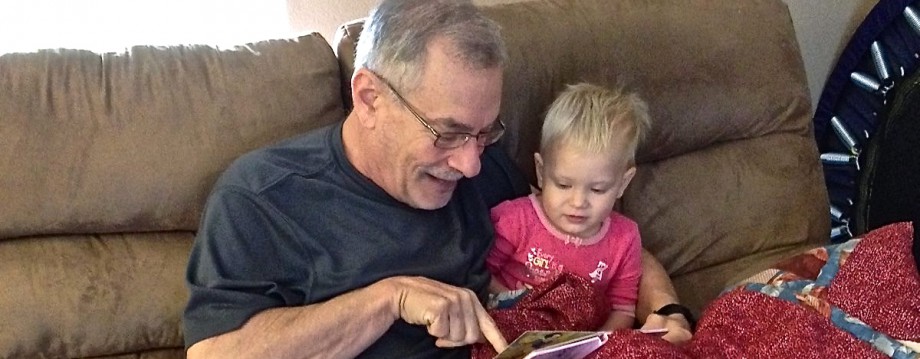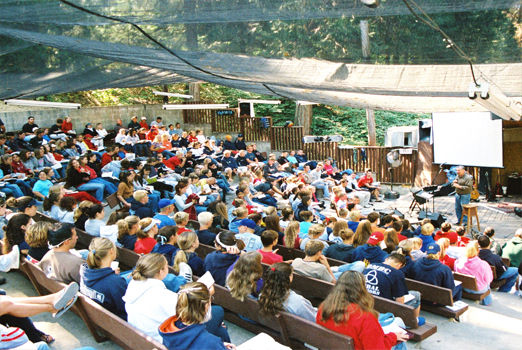Why do some people say the earth is millions of years old, and others say it’s only thousands of years old? I am so confused. I hear one thing in church, and another thing at school. Why can’t science and the Bible agree?
What great questions, asked by a junior higher at camp. I LOVE, LOVE, LOVE these kinds of questions.
Believe it or not, the answer can be found in one simple little verse buried in the 1st chapter of the 1st book of the Bible, Genesis 1:11 (New Living Translation).
Then God said, “Let the land sprout with vegetation—every sort of seed-bearing plant, and trees that grow seed-bearing fruit.
Do you see the answer there? I didn’t think so.
OK, then try this, Genesis 1:20-21.
Then God said, “Let the waters swarm with fish and other life. Let the skies be filled with birds of every kind.” So God created great sea creatures and every living thing that scurries and swarms in the water, and every sort of bird—each producing offspring of the same kind. And God saw that it was good.
Still don’t see it? Well then, let’s try one more, Genesis 1:25.
God made all sorts of wild animals, livestock, and small animals, each able to produce offspring of the same kind. And God saw that it was good.
Anything grab you about those three examples? What should grab you is this: God created a FULLY-FUNCTIONING (or mature) planet and universe.
At the moment God created plants, they were fully grown, bearing seeds, and able to provide food for the animals He would next create.
When God created birds and fishes, the oceans and lakes and rivers were instantly teaming with them. Birds were immediately flying through the air; fish were swimming in the oceans.
When God created the animals, they were immediately able to walk the earth, eat the food, and reproduce.
The same can be said of Adam and Eve who were immediately told to reproduce and populate the planet (Genesis 1:28).
Do you see it? God created a fully-functioning, mature planet.
This is what I want you to remember, one sentence that will absolutely harmonize what you hear in church and what you hear in school. Are you ready? Because when you read this next sentence, you will realize that there is absolutely NO CONTRADICTION between science and the Bible. Here it comes:
God created a YOUNG earth that looks very OLD.
Read that again:
God created a YOUNG earth that looks very OLD.
Think of this: If you had been onsite 5 seconds after God created Adam, you would not have seen a baby crying in a crib. You would have met a fully-grown adult, one who looked much older than he really was.
Same with the plants, fishes, and animals. And even the stars. Read it in Genesis 1:16-17.
God also made the stars. God set these lights in the sky to light the earth.
Now let me ask you a question. How could the stars, which are millions of lightyears away from the earth (which means that it should have taken millions of years for the light of those stars to reach the earth), be seen on the earth immediately after they were created? Unless the Universe appeared to be millions of years old, even though at the moment of its creation it was only a few seconds old?
God created a YOUNG earth that looks very OLD.
You might also be interested to note that the oldest continuously inhabited city in the world is Jericho. I’ve looked at the excavations. Archaeologists have taken that city down to bedrock. And guess what they found? Jericho dates to around 9,000 BC. Making the earth around 11,000 years old.
If you add up all of the years of genealogies in the Bible, and account for the fact that there are gaps in the genealogies (meaning that the genealogies in the Bible are not meant, and do not claim to be, 100% complete) you come to the same conclusion: The earth is around 11,000 years old.
Yet, if you date a rock or fossil, the test will indicate that it appears to be millions of years old. Why the difference? Because…
God created a YOUNG earth that looks very OLD.
No different than when people look at me and think I’m only 41, when I’m really 61! (Ha! Just kidding. If only that were true…)
You get the point.
So let not your heart be troubled, my friend. What you hear at church and read in the Bible is true: The earth is very young. AND what you hear at school and read in science books is true: The earth appears to be very old. No contradiction. No cause for concern. God had it all figured out right from the beginning.
He always does!
Hope this helps. And thanks for the question!
And by the way, here is a fascinating ARTICLE that goes right along with this one. Read and Enjoy!!!


